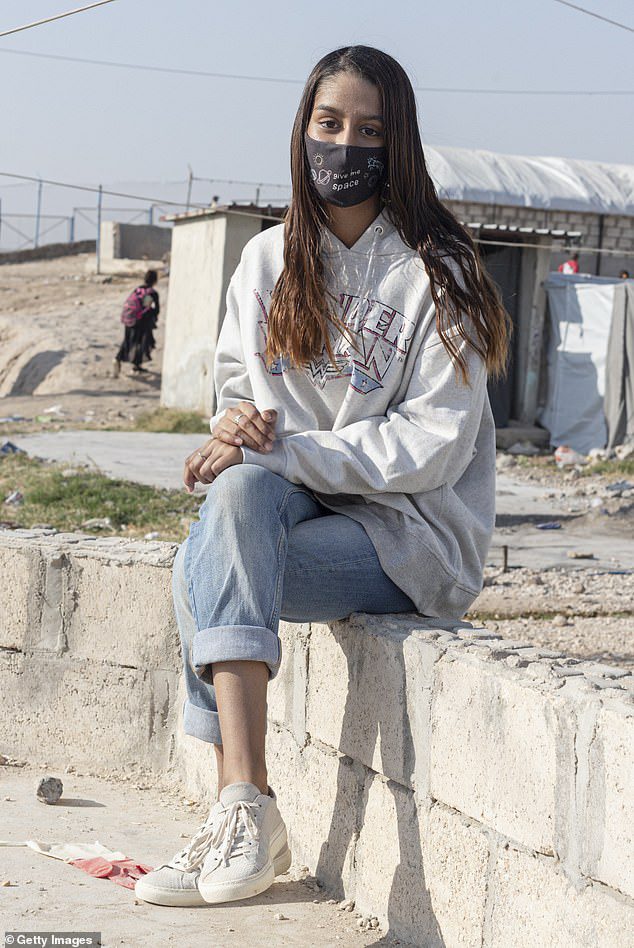Shamima Begum should be allowed back into the UK, a review of Britain’s counter-terrorism policy has found.
The ISIS bride is currently living in a detention camp in Syria after she fled her home in east London at the age of 15 to join Islamic State in 2015.
But the Independent Commission on UK Counterterrorism concluded after a three-year review that she and other Britons held in Syrian camps should be repatriated.
They said the camps risked being seen as ‘Britain’s Guantanamo’ – a reference to the US detention facility Guantanamo Bay, which was used to indefinitely hold al-Qaeda suspects in the years following the 9/11 atrocities in 2021.
The controversial comparison is meant to reflect that Begum is being held in detention without charge or trial. The commission added that conditions in Syrian camps such as Al Hol and Al Roj amounted to ‘inhuman and degrading treatment’.
Members of the body include former Attorney General Dominic Grieve, Baroness Sayeeda Warsi, Richard Barrett, the former global counter-terrorism director of MI6, and ex-Greater Manchester Police chief Sir Peter Fahy.
Estimates have suggested there could be between 50 and 70 British citizens held in Syrian camps – the majority of them women and also comprising 12 to 30 children.
Begum had her UK citizenship revoked after joining ISIS but has been pursuing legal campaigns to get it back and return to Britain.
Labour leader Sir Keir Starmer previously criticised the decision to strip Begum of her citizenship, but went on to change his stance by insisting that national security ‘comes first’.

Shamima Begum is currently living in a detention camp in Syria after she fled her home in east London at the age of 15 to join Islamic State in 2015

Begum had her UK citizenship revoked after joining ISIS but has been pursuing legal campaigns to get it back and return to Britain
The new report by the counter-terrorism commission has said that letting UK-linked people remain in such facilities in Syria was ‘inconsistent’ with human rights obligations.
It stated: ‘The government should facilitate the voluntary repatriation for British nationals, including those deprived of British nationality.
‘It should appoint a special envoy to oversee repatriation and inform returnees of the likelihood of prosecution.
‘As escapes from camps are likely to lead to some returns to the UK, an organised programme of return, rehabilitation and integration is the best long-term option for managing risk.’
The Daily Mail revealed in September how she was living on £100 a week in donations from friends and family while stuck in a detention camp in the Syrian desert as she continues to hope for a return to the UK.
Stateless Begum, 26, was seen for the first time in years that month when she stormed out of an interview at the grim al-Roj camp.
But the former schoolgirl Jihadi was said to be trying to keep her morale up by enjoying small luxuries such rudimentary beauty treatments paid for by donations from supporters – while battling with the UK government to get her citizenship back.
Begum, now 26, was born and raised in Bethnal Green, east London, before travelling to Syria to join ISIS in 2015.
She later became a child bride to Dutch Islamic convert Yago Riedijk, with whom she had three children who all died as infants.
Home Secretary Sajid Javid stripped her of British citizenship in 2019 – a decision later upheld by the UK’s Supreme Court.
Begum’s lawyers and supporters have argued that she was trafficked to Syria given the fact that she was a minor when it happened and should be allowed to return to the UK.
She was accompanied by two other schoolgirls, Kadiza Sultana and Amira Abase, with Sultana believed killed in an explosion and the fate of Abase remaining unknown.
The Court of Appeal threw out Begum’s challenge over the removal of her British citizenship last year – although her lawyers have vowed to ‘keep fighting’.
Gareth Peirce claimed her ‘indefinite arbitrary detention’ ran contrary to international law.
‘She and others, other women and children, are in what is not a refugee camp but a prison camp, and that is conceded by the United Kingdom, which has stated to the UN that it agrees that Geneva Convention articles apply,’ she said.
‘Unlawful as that is, there is no exit. There is no way that she can escape from unlawful imprisonment.’
Ms Peirce later said that conditions in the al-Hol camp where Ms Begum remains had worsened – while the Red Cross described the camp as ‘grim’ and ‘extremely volatile’.
But Sir James Eadie KC, for the Home Office, argued Begum was a threat to national security.
He told judges: ‘The fact that someone is radicalised, and may have been manipulated, is not inconsistent with the assessment that they pose a national security risk.’
Maya Foa, executive director of human rights charity Reprieve, called for Britons to be repatriated.
‘There’s an obvious solution that the US and other allies have been pushing for years: repatriate all the British families in North East Syria, close the detention camps, and prosecute the adults where appropriate,’ she said.
‘This is what the Kurdish and Syrian authorities want, and it’s best for local, global and British security. The UK Government’s refusal to act can only be for political reasons – it makes absolutely no sense as a security policy and is a moral travesty.’

ISIS bride Shamima Begum is seen here while imprisoned at the Al-Roj camp in Syria
The counter-terrorism commission has criticised a string of other government policies, including the law used to ban Palestine Action and the Government anti-radicalisation scheme Prevent.
The review found that the current official definition of terrorism is too broad and ‘extends beyond acts of violence or serious threat, creating uncertainty and overreach in its application’.
The body said: ‘Terrorism should be defined narrowly as acts intended to coerce, compel, or subvert government or an international governmental organisation, and the threshold for property damage should apply only to conduct causing serious risk to life, national security, or public safety, or involving arson, explosives, or firearms.’
It said that measures used to ban groups such as Palestine Action should be restricted so that they are only used to protect the public from terrorism, and that proscription of terror groups should lapse after five years unless renewed.
The report said: ‘When a group is proscribed, individuals can face prosecution for membership, inviting or expressing support, or wearing associated symbols or uniforms.
‘Providing funding or handling property linked to a proscribed organisation may constitute a criminal offence, and any act carried out for the benefit of a proscribed group can be treated as an act of terrorism.
‘These far-reaching implications can create confusion, deter lawful civic engagement, and strain relations with communities connected to affected organisations – particularly where banned groups also pursue political objectives.’
It wants increased parliamentary scrutiny of decisions to proscribe groups, and for suspects to only be charged under section 12 or 13 of the Terrorism Act, which cover support for banned groups, ‘where there is clear intent to commit the offence’.
Kneecap rapper Liam Og O hAnnaidh, whose stage name is Mo Chara, was charged under section 13 for allegedly holding up a Hezbollah flag at a gig, before the case was thrown out due to a technical error.
Hundreds of alleged Palestine Action protesters have been charged under the same law, the majority for holding up banners that said: ‘I oppose genocide. I support Palestine Action.’
The commission also found that the Government anti-radicalisation scheme Prevent is being used too broadly.
The report said: ‘Prevent referrals increasingly involve individuals experiencing complex vulnerabilities, including mental ill health, social isolation, or neurodivergence, rather than clear terrorism-related risks.
‘This shift has blurred Prevent’s purpose and stretched its remit beyond its original aim.’
Figures released last week showed there were 8,778 referrals of individuals to the anti-extremism scheme in 2024/25 – up 27 per cent from 6,922 in the previous year, according to Home Office data.














